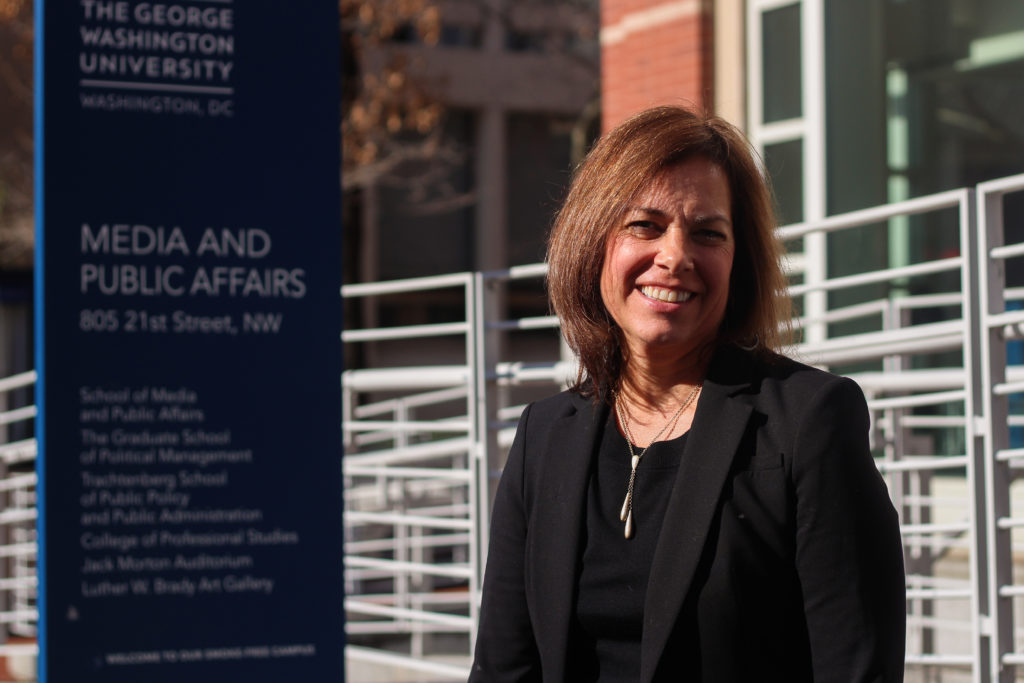The School of Media and Public Affairs’ first-ever professor of science communication will teach students how to relay scientific knowledge to the general public.
Lisa Palmer, a science journalist and author, will hold a visiting professorship in SMPA funded by National Geographic for at least three years to teach students science reporting and communication techniques. Frank Sesno, the outgoing director of SMPA, said the professorship allows the school to teach students how to effectively talk with scientists and relay the importance of scientific issues and discoveries to the public.
Sesno, who announced in December that he will leave the school’s directorship at the end of the academic year to take a sabbatical, said Palmer will help journalism and political communication students understand how wide-reaching issues like air and water pollution impact everyday life.
“What she’s going to help our journalism students do is understand what those science components are and appreciate what scientific research really is,” Sesno said.
Palmer is teaching a class on science reporting this semester, according to the schedule of classes. Sesno said the class will focus on science reporting and writing techniques, adding that Palmer will teach students how to explain scientific jargon and convey data that is easily digestible.
He added that the aim of the class is to teach students how to make scientific knowledge and discoveries more accessible to the general public.
“With anything that’s conveying data or statistical information, you’ve got to contextualize it, you’ve got to figure out how it can support a narrative or how it can drive a narrative,” he said.
Sesno said Palmer will also collaborate with correspondents from Planet Forward – a project Sesno created 11 years ago that teaches college students how to tell stories about the environment – on website content and will assist with the development of a mentoring and internship program for SMPA students. He said officials are still in the process of determining what Palmer’s responsibilities with Planet Forward will entail.
Sesno said he partnered with officials from the National Geographic Society to develop the professorship. National Geographic provided a “six-figure gift” to finance the professorship – including Palmer’s salary – for three years, he said.
“I express my gratitude for what they’ve done because it’s really very thoughtful, very generous and going to have a tremendous impact on students and others here and beyond,” Sesno said.
Palmer did not return multiple requests for comment.
Science journalism and communication experts said offering classes that teach students skills related to science reporting will grant future journalists and communicators covering science issues the ability to correct misinformation.
Susan Swanberg, an assistant professor of science journalism at the University of Arizona, said classes specifically geared toward science reporting can help address a “disconnect” in communication between reporters and scientists.
She said scientists are sometimes hesitant to cooperate with journalists covering their research because they fear the findings will be oversimplified or inaccurately reported. Swanberg added that emphasizing the importance of learning to read scientific research and gaining familiarity with common scientific terminology can bridge the gap between the two groups.
“Sometimes communication between journalists and scientists has been historically difficult, so it’s very important to teach students skills about interviewing scientists, breaking through that barrier and learning to communicate,” she said.
Swanberg added that training future science journalists and communicators how to explain the work of scientists in a way that the general public understands can dispel potentially harmful misinformation surrounding controversial political issues like climate change and the anti-vaccination movement.
“It really is necessary for science journalists and other communicators to help the public understand these complex issues,” she said.
Melissa Hendricks, the associate director of the master’s of science writing program at Johns Hopkins University, said offering coursework in science communication signals that SMPA officials are taking science-related issues like climate change “seriously.”
Hendricks said journalists must be able to explain the importance of developments in fields like artificial intelligence and gene-editing technology to ensure the public makes well-informed decisions on how to interact with and respond to new scientific innovations and discoveries.
“The public needs to know this information, and journalism schools and other programs are responding to that, as they should,” Hendricks said.





